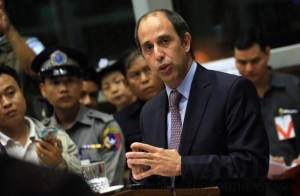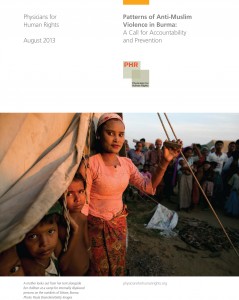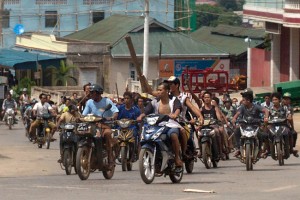Posts Tagged ‘Impunity’ (25 found)
Burma Government Must Prevent Ongoing Communal and Religious Violence by Tackling Impunity
 This week, United Nations Special Rapporteur on the situation of human rights in Burma, Tomás Ojea Quintana, reported that during his recent 10-day official mission to Burma his convoy was besieged by anti-Muslim protestors in Meikhtila, Mandalay Region, the scene of anti-Muslim violence in March of this year. However, the week’s unrest did not stop there: a few days later, Buddhist mobs burnt down dozens of shops and homes belonging to Muslims in Kantbalu, Sagaing Region, after a Muslim man was arrested for allegedly attempting to rape a Buddhist woman. Unfortunately, such incidents in Burma are nothing new: 2013 has seen outbreaks of religious and communal violence afflicting increasing numbers of towns across the country. Violence flared up most notably in Meikhtila on 20 March, lasting for more than a week, and also on 28 and 29 May in Lashio, Shan State, where one Muslim was killed and four Buddhists injured, and on 29 May in Mone, Kyauk Gyi Township, Pegu Region, where mobs destroyed a mosque and a madrasa. In addition, nearly 250,000 people, the majority of whom are Muslims, have been displaced by the violence across the country thus far […]
This week, United Nations Special Rapporteur on the situation of human rights in Burma, Tomás Ojea Quintana, reported that during his recent 10-day official mission to Burma his convoy was besieged by anti-Muslim protestors in Meikhtila, Mandalay Region, the scene of anti-Muslim violence in March of this year. However, the week’s unrest did not stop there: a few days later, Buddhist mobs burnt down dozens of shops and homes belonging to Muslims in Kantbalu, Sagaing Region, after a Muslim man was arrested for allegedly attempting to rape a Buddhist woman. Unfortunately, such incidents in Burma are nothing new: 2013 has seen outbreaks of religious and communal violence afflicting increasing numbers of towns across the country. Violence flared up most notably in Meikhtila on 20 March, lasting for more than a week, and also on 28 and 29 May in Lashio, Shan State, where one Muslim was killed and four Buddhists injured, and on 29 May in Mone, Kyauk Gyi Township, Pegu Region, where mobs destroyed a mosque and a madrasa. In addition, nearly 250,000 people, the majority of whom are Muslims, have been displaced by the violence across the country thus far […]
PHR Documents Systematic Patterns of Anti-Muslim Violence in Burma
New Report Shows Government’s Failure to Protect Muslims From Widespread Attacks
Physicians for Human Rights (PHR) today released a report documenting the recent wave of violence against Muslims throughout Burma, whose government has created a culture of impunity for the violators and has failed to protect the Muslim minority.
The report details a number of serious human rights violations that have taken place over the last two years, which have resulted in the displacement of nearly 250,000 people and the destruction of more than 10,000 homes, scores of mosques, and a dozen monasteries […]
• • •Patterns of Anti-Muslim Violence in Burma: A Call for Accountability and Prevention
 In this report, PHR documents how persecution of and violence against the Rohingya in Burma has spread to other Muslim communities throughout the country. PHR conducted eight separate investigations in Burma and the surrounding region between 2004 and 2013. PHR’s most recent field research in early 2013 indicates a need for renewed attention to violence against minorities and impunity for such crimes […]
In this report, PHR documents how persecution of and violence against the Rohingya in Burma has spread to other Muslim communities throughout the country. PHR conducted eight separate investigations in Burma and the surrounding region between 2004 and 2013. PHR’s most recent field research in early 2013 indicates a need for renewed attention to violence against minorities and impunity for such crimes […]
Call for Probe Into Military Junta’s Crimes Against the Media
Reporters Without Borders has written an open letter to Burmese President Thein Sein, who begins a two-day visit to France tomorrow, calling for an investigation into the former military government’s crimes against the media since 1962 […]
• • •Myanmar: UN Expert Greets Abolition of Notorious Border Security Force in Rakhine State and Calls for Accountability
The United Nations Special Rapporteur on the human rights situation in Myanmar, Tomás Ojea Quintana, today welcomed the abolition of Nasaka, the notorious border security force operating in Rakhine State. He urged the authorities to investigate and hold accountable those members of the force responsible for human rights abuses […]
• • •One Year After the Violence Began: Civil Society Organisations Deeply Concerned by the Human Rights and Humanitarian Situation of Stateless Rohingya
The Rohingya, a stateless minority of Myanmar, have endured decades of abuse, persecution and discrimination. One year ago, on 3 June 2012, the massacre of ten Muslims travelling in Rakhine State, following the killing and reported rape of a Buddhist woman, marked the beginning of a series of violent attacks against the Rohingya and other Muslim communities. The violence of June and October 2012 resulted in countless deaths, destruction to property, large scale internal displacement and segregation within Rakhine state of Myanmar. Consequently, thousands of Rohingya have fled to Bangladesh, Thailand, Malaysia and
beyond […]
UN Myanmar Expert: Fatal Shooting of Rohingya Women the Latest Product of Impunity
The United Nations Special Rapporteur on the human rights situation in Myanmar, Tomás Ojea Quintana, today said that the fatal shooting last week of three Rohingya women participating in a peaceful protest in Rakhine State is the latest shocking example of how law enforcement officials operate with complete impunity there […]
• • •Burma Government Must End Impunity and Promote Religious Tolerance
 This week, mosques, schools and shops were burnt down, Muslims populations displaced, people injured and killed, and journalists attacked. These dramatic events are now common news coming out of Burma. In the last three months, religious violence took place in more than 18 townships hundreds of kilometers apart from each other, more than 44 people died, and more than 13,000 have been displaced. Yet, no appropriate actions have been taken to halt the spread of violence, extremist religious views and distrust among communities.
This week, mosques, schools and shops were burnt down, Muslims populations displaced, people injured and killed, and journalists attacked. These dramatic events are now common news coming out of Burma. In the last three months, religious violence took place in more than 18 townships hundreds of kilometers apart from each other, more than 44 people died, and more than 13,000 have been displaced. Yet, no appropriate actions have been taken to halt the spread of violence, extremist religious views and distrust among communities.
On 28 and 29 May, violence spread to Lashio, Shan State, where one Muslim was killed and four Buddhists wounded. Mobs of young men on motorcycles roamed the city with swords, destroying shops and shouting they would “kill any Muslims they see on the road.” Two Democratic Voice of Burma reporters were injured and their SIM cards stolen. The police again failed to stop the violence and protect the population. According to a New York Times source, the first police units arrived two hours after the violence started and did not confront the rioters. More than 1,400 Muslims were displaced and found shelter in a Buddhist temple. On the night of 29 May, violence spread to the town of Mone in Kyauk Gyi Township, Pegu Region, where mobs destroyed a mosque and madrasa.
• • •Lifting EU Sanctions Will Unlikely Lead to an Improved Human Rights Situation in Burma
The International Federation for Human Rights (FIDH) and its member organization Altsean-Burma regret that the European Union (EU) has discarded its own benchmarks for reform in order to dismantle sanctions against Burma/Myanmar.
The disposal of this important and legitimate instrument to push forward positive change in the country is inconsistent, as mass atrocities continue in Kachin state and targeted violence endangers Rohingya and other Muslims in the western and central regions. In addition to undermining its own credibility, the EU decision threatens to decelerate the pace of reforms and prolong a state of impunity in Burma/Myanmar […]
• • •Resolution on the Situation of Human Rights in Myanmar
The full text of the United Nations Human Rights Council Resolution that calls on the government to end human rights violations and ensure accountability and end impunity, maintains the resolution under agenda Item 4 of “Human rights situations that require the Council’s attention” and also extends the mandate of Special Rapporteur on human rights in Burma, Tomás Ojea Quintana.
• • •








 All posts
All posts